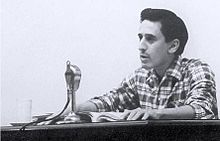San Salvador (El Salvador), 1935 – 1975
Flávio Aguiar

The humor that characterized him reflected a lucid awareness of the contradictions of his life as a revolutionary bourgeois, the son of a wealthy father and a poor mother. He joined the Communist Party of El Salvador while still young and survived constant persecution and imprisonment, but he did not survive the actions of the extremist wing of the Revolutionary Forces, who assassinated him in the month he would have turned 40. He published his first book, La ventana en el rostro, in 1961. Much of the poetry he published (Poemas, 1968) resonates with his commitment to social revolution and the desire to bear witness to his times.
An emblematic intellectual, he built a literary project that evoked the “historical responsibility” spoken of by Bolivian writer Edmundo Paz Soldán, without compromising the excellent aesthetic quality of his books. He received the Casa de las Américas Prize for Taberna y otros poemas (1969). He also wrote narratives and essays that are still little known. He wrote Los pequeños infiernos in 1970.


